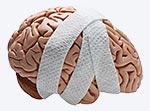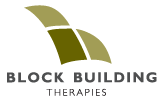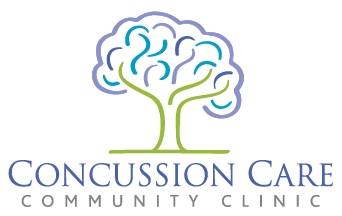A concussion is a common form of brain injury caused by a direct or indirect hit to the head or body. This affects the brain and its ability to function which results in physical and sensory symptoms. Typically, there is no visible injury to the brain, therefore, tests like MRI or CT scans are usually normal.

There are a number of symptoms that arise as a result of a concussion. They include the following:
- Physical Changes: Headaches, dizziness, nausea, poor balance, fatigue, sleep changes, vision changes and sensitivity to light and noise.
- Cognitive Changes: Difficulty concentrating, memory problems, trouble finding words, difficulty expressing self and feeling less alert.
- Emotional Changes: Irritability, anxious, depressed, more emotional (crying).
All of these symptoms are common and should improve over time.
Most signs and symptoms of a concussion resolve between 7 and 10 days. However, some may last for weeks or months. Having multiple concussions within a period of time also affects the rate of recovery.

After a child has sustained a concussion, the brain will need time to heal. Limiting activities around school and sport may be required to promote a faster recovery. Activities that involve more concentration such as reading, writing, working on computers or video games may worsen symptoms. These activities need to be carefully managed and monitored by a health care professional.
Emotional changes are very common for children after a concussion. Your child may feel sad, frustrated or angry around their inability to return to school or sports. Changes in relationships with friends is also common. Accommodations may be required at school to promote recovery such as more time for assignments or tests, reduced hours at school, frequent rest breaks and special tutoring.
Source: Centre for Disease Control and Prevention (CDC)

- No Activity.
- Light Activity.
- Aerobic Exercise.
- Sport (no contact).
- Drills (without contact).
- Drills (with contact).
- Game Play.
It is essential that all return to play guidelines be implemented and monitored by a health care professional trained in concussion management.
Source: Ontario Neurotrauma Foundation Guidelines for concussion/Mild Traumatic Brain Injury and Persistent Symptoms, Second Edition 2013.
Following a diagnosis of a concussion, many people will resolve all symptoms by following their doctor’s guidelines on rest, as well as a return to work, school, play protocol. Programs offered at Concussion Care Community Clinic are targeted to persons who are having symptoms longer than the typical recovery time and who are affected in their ability to function at home, work or school.
Concussion Care Community Clinic is a private practice and is therefore not covered under Manitoba Health. The fees are guided by the service and include both flat fee rates and hourly therapy rates. Third Party insurance providers may cover associated costs with the programs.
All referred clients are seen within 1 to 2 weeks of the referral being received and accepted at Concussion Care Community Clinic.
A referral form for our concussion programs can be found on our website; the right hand side pop out window contains Referral Forms. It must be filled out and sent directly to Concussion Care Community Clinic for review and approval.
A physician’s referral is not required to be seen and accepted at Concussion Care Community Clinic. However, it is strongly recommended that a physician’s note / letter accompany the referral in order to gather as much medical information as possible. All clients seen at Concussion Care Community Clinic must have been seen and diagnosed by a physician as having a concussion.

If your patient or client is still having symptoms after 4 – 6 weeks such as difficulties with emotional control, attention/concentration, memory, fatigue, sleep/movements, vertigo/dizziness or headaches, it may be appropriate to refer them to our concussion program. The program focuses on educating clients about their symptoms and how to better manage them during their recovery. This may include providing education on sleep hygiene, cognitive or physical exertion, modifications at school/work or managing social situations. A full report is completed and sent to the client and physician with recommendations to promote a speedy recovery.
If you are meeting with a client who has long term persistent symptoms after a mild brain injury or concussion, a referral to our reactivation program may be beneficial. The goal of this program is to empower clients with the skills, knowledge and confidence to manage and live with their long term symptoms. Our clinic focuses on increasing functions at home, work or school despite having symptoms that have been present for 6 months, 1 year or even 2 years post injury. Our professional staff focus on assisting the clients to cognitively reframe challenging tasks or overcome anxieties of symptom return or exacerbation. Ultimately, we provide clinical services that allow clients to school, work and life roles.













